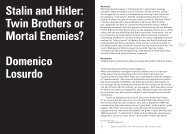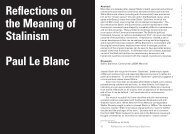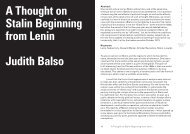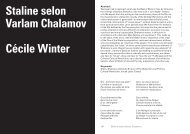In light of Henry Allison’s quite plausible interpretation ofthe “Transcendental Deduction,” according to which Kant positsa “reciprocity thesis” holding that the transcendental unity ofapperception entails a mutual, two-way interdependency of knowingsubject and known object upon each other (with the claim that thesubject can know itself as a unifying producer only in and through theproduced unity reflected back to it by the objects it itself is responsiblefor unifying), Hegel’s absolute idealist appropriation of Kant’ssubjective idealist transcendental unity of apperception cannot butinvolve a fundamental transformation of the sense and implicationsof the latter. 50 A famous one-liner from the Critique of Pure Reason,one directly related to what Allison has in view apropos the allegedreciprocity between apperceiving subjectivity and apperceivedobjectivity, has it that, “The a priori conditions of a possible experiencein general are at the same time conditions of the possibility of theobjects of experience.” 51 With his absolute idealism as, in part, asublation of subjective idealism in its anti-realist, deontologized onesidedness,Hegel arguably radicalizes the reciprocity at the base ofKant’s “Transcendental Deduction” such that the (epistemological)truthfulness of this just-quoted one-liner from the first Critique must becounterbalanced by also positing the equal (ontological) truthfulnessof its precise inversion: “Conditions of the possibility of the objectsof experience (i.e., the “in itself” [an sich] delineated in the “ObjectiveLogic” prior to the “Subjective Logic” of “The Doctrine of the Concept”)are at the same time the a priori conditions of a possible experience ingeneral (i.e., the “in and for itself” [an und für sich] delineated in the“Subjective Logic” only after the “Objective Logic”).”Additional clarity and concreteness can be lent to this by anotherreturn to Hegel’s Phenomenology of Spirit: specifically, the openingof its third section on “Reason” (Vernunft) (Ameriks and Harris bothcorrectly note that Pippin, although preserving a crucial role for thePhenomenology in the mature [post-1807] Hegelian System, 52 ignoresthis section in his predominant focus on the preceding first two sectionsdealing with “Consciousness” [Bewußtsein] and “Self-Consciousness”CRISIS&CRITIQUE#3[Selbstbewußtsein] 53 ). In the wake of the dialectics running fromConsciousness through Self-Consciousness, the Reason arising at thestart of this third section is characterized by Hegel as being “certain”—however, at this juncture, it still has yet to prove the “truth” (Wahrheit)of this its certainty (Gewißheit) through the tests of its experiences—of the existence of fundamental structural isomorphisms between itsminded subjectivity and worldly objectivity. 54 Reason balances out thelop-sided preponderances of object and subject posited by the earlierfigures of Consciousness and Self-Consciousness respectively. It doesso by adopting the view, into which it has been driven by the precedingdialectical moments sublating the shapes in the Phenomenologycoming before it, that:…self-consciousness (Selbstbewußtsein) and being (Sein) arethe same essence (Wesen), the same, not through comparison,but in and for themselves (an und für sich). It is only the onesided,spurious idealism (einseitige schlechte Idealismus) thatlets this unity (Einheit) again come on the scene as consciousness(Bewußtsein), on one side, confronted by an in-itself (Ansich), onthe other. But now this category or simple (einfache) unity of selfconsciousnessand being possesses difference in itself; for itsessence is just this, to be immediately one and selfsame inotherness (Anderssein), or in absolute difference (absoluteUnterschiede). The difference therefore is, but is perfectlytransparent, and a difference that is at the same time none.It appears as a plurality of categories. 55To begin with, the objection to Kantian transcendental idealismas subjectivism in this passage is so obvious as not to requiredeciphering and explanation. Moreover, Hegel’s wording here inthe Phenomenology is echoed in Pippin’s preferred later moment ofthe Science of Logic, thus indicating that the latter text’s kind wordsfor the transcendental unity of apperception of the B-Deduction aresignificantly tempered by a rejection of the type of idealism to whichKant shackles this transcendentally deduced unity. In the Science ofLogic, Hegel recasts Kant’s transcendental unity of apperception as (toCRISIS&CRITIQUE#350 Kant 1998, B136-139 (pp. 248-250); Allison 1983, pp. 144-145.51 Kant 1998, A111 (p. 234).52 Pippin 1988, p. 17; Pippin 1989b, pp. 38, 91-94, 178, 256; Pippin 1989a, p. 32; Pippin 1990, pp.843-844, 847-848.53 Ameriks 1992, pp. 199-200; Harris 1989, p. 27.54 Hegel 1970c, pp. 178-181; Hegel 1977c, pp. 139-142.55 Hegel 1970c, pp. 181-182; Hegel 1977c, p. 142.384 “Where to Start?: Robert Pippin, Slavoj Žižek...385“Where to Start?: Robert Pippin, Slavoj Žižek...
paraphrase the Phenomenology) the becoming-subject of substance,namely, a pre-existent objectivity in itself (“something external andalien”) being “comprehended,” “pervaded,” and thereby “idealized” soas to achieve the status of (also) being in and for itself via subjectivity(with subjectivity in this instance being nothing other than the selfreflectivity/reflexivityof substantial objectivity itself). As the abovequotation manifestly shows (along with adjacent material in the sametext 56 ), this recasting transpires already in the Phenomenology evenbefore it occurs again in the Science of Logic.Additionally, Hegel’s recourse in this passage to the language ofpost-Kantian dialectical-speculative logic (in particular, non-bivalentideas about the identity of identity and difference 57 ) marks a break withKant (in particular, the classical logic of Kant’s faculty of the non/prespeculativeunderstanding [Verstand]) that allows Hegel to be both anidealist and a realist simultaneously. As he maintains in the Scienceof Logic’s first book right on the heels of stringently criticizing Kantand Fichte, “the opposition of idealistic and realistic philosophy hasno significance.” 58 Already in his 1801 Differenzschrift, Hegel indicatesthat true idealism also involves realism (pace Kant’s and Fichte’ssubjectivism qua anti-realism). 59 In 1802’s article “How the OrdinaryHuman Understanding Takes Philosophy (as Displayed in the Works ofMr. Krug),” he gestures at a form of (post-)Kantian idealism overcomingthe ostensibly false dilemma between realism and idealism—“transcendental idealism does not just concede… but asserts the realityof the external world, just as much as its ideality.” 60 His 1803/1804 Jena“First Philosophy of Spirit” is utterly scathing about the anti-realismof subjective idealism. 61 And, he repeats these stipulations aproposidealism in the Encyclopedia. 62 Considering the sustained maintenanceof this stance on the realism-idealism distinction by Hegel in varioustexts from 1801 until his death, Pippin’s dismissal of the Science of56 Hegel 1977c, p. 144.CRISIS&CRITIQUE#3Logic’s “Remark on Idealism” in “The Doctrine of Being” (from which Iquoted a moment ago) as unrepresentative of Hegel’s own convictionsis quite dubious. 63Immediately following the above block quotation in thePhenomenology, Hegel voices the complaint he often repeats, alongwith his fellow post-Kantian idealists, about Kant’s alleged dogmatic,unsystematic cutting-and-pasting from antiquated traditional logictextbooks in the composition of his “Transcendental Analytic” of theconcepts and categories of the understanding (i.e., the lack therein of aproperly scientific deduction of these concepts and categories). 64 And,in the exact same context, he also directly addresses the matter of theKantian transcendental unity of apperception in a manner undeniablyforeshadowing his later comments upon it in the Science of Logic:…only in the unity of apperception lies the truth of knowing(nur die Einheit der Apperzeption ist die Wahrheit des Wissens).The pure Reason (Die reine Vernunft) of this idealism, in order toreach this ‘other’ (Anderen) which is essential to it, and thus is thein-itself (Ansich), but which it does not have within it, is thereforethrown back by its own self on to that knowing which is not aknowing of what is true (Wahren); in this way, it condemnsitself of its own knowledge and volition to being an untrue kindof knowing, and cannot get away from ‘meaning’ (Meinen) and‘perceiving’ (Wahrnehmen), which for it have no truth (Wahrheit).It is involved in a direct contradiction (schlechthinEntgegengesetztes); it asserts essence (Wesen) to be a dualityof opposed factors, the unity of apperception and equally a Thing(das Ding); whether the Thing is called an extraneous impulse(fremder Anstoß), or an empirical or sensuous entity (empirischesWesen oder Sinnlichkeit), or the Thing-in-itself (das Ding ansich),it still remains in principle the same, i.e. extraneous (Fremde) tothat unity. 65CRISIS&CRITIQUE#357 Hegel 2002c, p. 154; Hegel 1977a, p. 156; Schelling 1984, pp. 136, 143.58 Hegel 1969a, p. 155.These assertions audibly resonate with Hegel’s reduction, in aportion of the Science of Logic I referenced earlier, of the epistemology59 Hegel 1977a, pp. 115, 127, 165-167.60 Hegel 2002d, p. 229.63 Pippin 1993, p. 289.61 Hegel 1979, pp. 223-226.64 Hegel 1977c, pp. 142-145.62 Hegel 1991c, §95-96 (pp. 152-153).65 Hegel 1970c, pp. 184-185; Hegel 1977c, pp. 144-145.386 “Where to Start?: Robert Pippin, Slavoj Žižek...387“Where to Start?: Robert Pippin, Slavoj Žižek...






